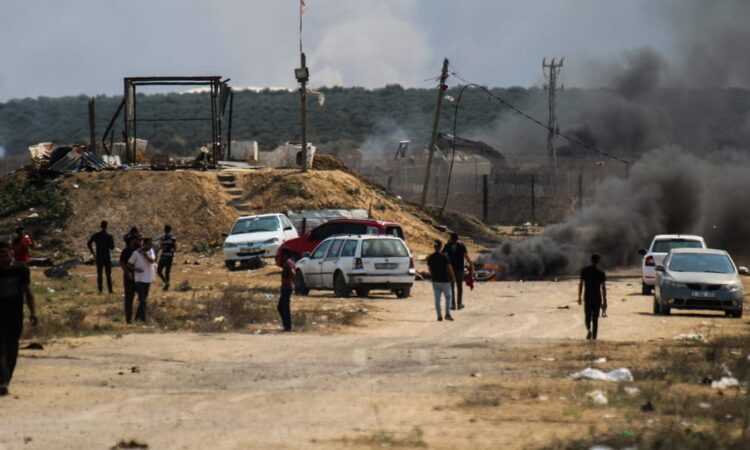
Iranian Supreme Leader Ayatollah Ali Khamenei’s top military adviser said Tehran supported the attacks by Hamas against Israel on Saturday and would continue to back the Islamist fighters “until the liberation of Palestine and Jerusalem.”
The remarks by Yahya Rahim Safavi, a former commander of the country’s Revolutionary Guards, will only fan suspicion that Tehran played a direct role in supporting its traditional ally, Hamas, in the well-planned attacks that have killed at least 40 people and injured more than 700.
Interventions by Rahim Safavi and other senior Iranian policymakers will also be seen by Iran’s long-running regional rival Saudi Arabia as a threatening signal that Tehran is willing to stir up regional conflict to prevent Riyadh from normalizing ties with Israel, as the U.S. wants.
“We support the commendable ‘Al-Aqsa Storm’ operations,” Rahim Safavi was quoted as saying by state media in Iran, using Hamas’ name for Saturday’s rocket attacks and incursions.
The assault from Gaza came just four days after Khamenei posted on social media: “The usurper regime is coming to an end. Today, the Palestinian youth and the anti-oppression, anti-occupation movement in Palestine is more energetic, more alive, and more prepared than ever during the past 70 or 80 years. God willing, the movement will achieve its goals.”
The militant offensive comes at a highly sensitive diplomatic moment, with Saudi Arabia intimating that it could normalize relations with Israel — an alliance that would profoundly unsettle Tehran. Saudi Crown Prince Mohammed bin Salman will have triggered alarm bells in Iran with an interview on Fox News last month when, addressing diplomacy with Israel, he said: “Every day, we get closer.”
In recent weeks, Iran’s leaders have railed against a U.S.-backed proposed deal between Israel and Saudi Arabia, with Khamenei on October 3 saying countries aiming to normalize relations with Israel would be taking a big risk. “The position of the Islamic Republic is that countries that make the gamble of normalization with Israel will lose. They are betting on a losing horse,” Khamenei said.
Hezbollah, another militant group linked to Iran, also appeared to link Saturday’s violence with the Saudi rapprochement, saying in a statement the attack was a “decisive response to Israel’s continued occupation and a message to those seeking normalization with Israel.”
The start of the assault, the largest clash since Israel and Hamas fought a 10-day battle in 2021, was announced by Hamas military commander Mohammad Deif. “This is the day of the greatest battle to end the last occupation on earth,” he said, adding that 5,000 rockets had been fired at Israel.
Israeli officials have been predicting since August a likely attack from either Hamas or Hezbollah, or both, amid increasing skirmishes in the border area between Israel and Lebanon. In the summer, Israeli Defense Minister Yoav Gallant warned if war were to break out with Hezbollah it would result in Lebanon being returned “to the stone age.”
In September, there were meetings in Lebanon between Hamas and Iranian Revolutionary Guard commanders, according to Jason Brodsky, a non-resident scholar at the Middle East Institute. That provides “some clues as to organization of this assault on Israel today,” he said.
Hostility between Israel and the Gaza-based Islamist Hamas movement erupted into war in 2009, 2012, 2014 and 2021. Ties between Hamas and Iran, its main backer, became strained on the outbreak of the Syrian civil war, with Tehran backing President Bashar al-Assad and the Palestinian group supporting rebels fighting to topple the Syrian leader.
Hamas pulled closer to Saudi Arabia and Qatar as a result, but it had little choice but to re-establish links with Iran as the civil war raged in Syria. The Palestinian group became more and more isolated because of Arab Spring developments and grew increasingly cash-strapped when funding from Tehran and Damascus, where it headquartered until 2012, dried up.
It suffered further financial problems from the ousting of Egyptian President Mohamed Morsi, the first Muslim Brotherhood leader of Egypt. And a change in leadership in Qatar also hit it financially, forcing Hamas to backtrack on its position on the Syrian civil war and return cap in hand to Tehran.
Hand of Iran
“I believe that the hand of Iran will be found in elements of this,” said Jonathan Schanzer, senior vice president for research at the Foundation for the Defense of Democracies, a Washington-based think tank.
He said the assault by Hamas was a marked change from the Palestinian group. Before it was focused on suicide bombings and crude rocket attacks; this time it is “going deep into Israel and pulling off an operation that marks a significant departure. “This strikes at the heart of the Israel Defense Force. It strikes at the heart of Israel. This is unlike anything that we’ve seen from Hamas in the past. And it demonstrates a strategic decision undertaken by the organization that I don’t think would happen without its patrons in Tehran.”
“There are questions about whether other fronts will now turn turn hot, which is a serious concern that Israel has long held with regard to the Iranian encirclement strategy,” he added.
“Will the West Bank turn hot? Will Shi’ite militias activate in places like Syria? Will Hezbollah get involved? We will see over the next few hours or days to come whether this was just simply an attempt by Hamas to make a statement and to announce itself anew or whether this is part of a broader strategy where other elements beholden to Iran participate. This is the war I think everyone has feared with an Iranian goal of encirclement and perhaps even an attempt to strangle the Israeli state.”





